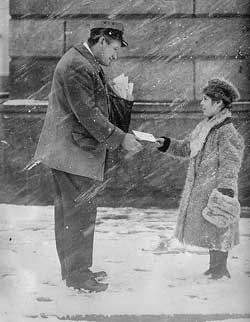Christmas Day: On Joy and Sorrow
Here we find ourselves on Christmas day yet again. This year the meteorologists have forecast the weather in St. Louis at 50 degrees for later today – less than ideal for any dreams of a white Christmas, though certainly closer to what one might find in Bethlehem. Christmas is here, but with the warmth of much of this December, it almost feels delayed.
Christmas often serves to be something of an odd set of contrasts in more than just the superficial matter of weather. We read of the joy of the angels, wise men and other players in the events of the birth of Christ. We also read of the not so good King Herod, who murdered children in the hopes of snuffing out any potential claimants to his throne.
Heaven had broken into the world, but the old political games continued unabated. Normal life went on as most people failed to ever hear an angel sing. As the Gospel of John says, “He was in the world, and the world was made through him, yet the world did not know him.” Today, it is hard to not know Christ’s birth – all things Christmas-y are all about us – but we often still do not know him who is born and what his coming stands for.
The first Christmas was a series of contrasts, but so too is today. Joyous music and festive parties are put up against those who grieve for lost loved ones, those who face conflicts at work or amongst family and friends, those who find themselves brokenhearted and alone.
We might ask, if Christ came to bring forth his kingdom and his advent was a cause for celebration, why is it that life remains the same bipolar mix of happiness and sorrow that it was before the first Christmas? Did Christmas day mean nothing at all?

SOURCE: LOC/Bains News Service
That is a good question, and one that many of those who were around Jesus during his ministry asked. Ultimately, quite a few of those many rejected his message and went back to their everyday business. If sorrow and happiness continued to be intermingled, why not keep plodding along as normal? If the Romans were still going to be in power, persecuting the Jewish people as usual, why follow an alleged king of some less visible realm?
But, one thing the Christmas story never claimed is the promise of ease. From the beginning, the story of Christmas is one of struggle. Mary could hardly spend her time rejoicing when many of her neighbors probably would have liked to stone her to death. Her own fiancé, Joseph, planned to divorce her – engagements were more serious matters then than we often take them to be today, thus requiring divorce to break one off – until God gave him a dream that confirmed to him Mary’s story about her expected baby was truthful.
Nor was the life of Jesus ever easy. It was excruciatingly hard, ultimately to the point of an untimely, unjust death at age 33.
The joy of Christmas is not that somehow the pains of life will magically vanish on this day. Rather, the joy of the day is that God himself appeared to begin the long march towards a righted world. God himself came to experience the sorrows we face and to do something about them. God came to give himself that our flaws — our sins — might be forgiven. None of this is an instantaneous correction on Christmas morn, mind you, but the sort of epic shift that would require the death of Jesus, his resurrection and his promised return. The joy is in the promise that even where things seem hopelessly mired, that they will not remain so forever.
Things continue to be hard, but Christmas day reminds us that life is not a struggle in a nihilistic nothingness. Christmas day shows us that we are really in a dark tunnel with the light of hope up ahead. This world – a world we rightly love but also rightly see as flawed – is going to one day be how it ought to be once again.
Christ makes all things new. Even us. That’s the joy of Christmas.
Timothy R. Butler is Editor-in-Chief of Open for Business.